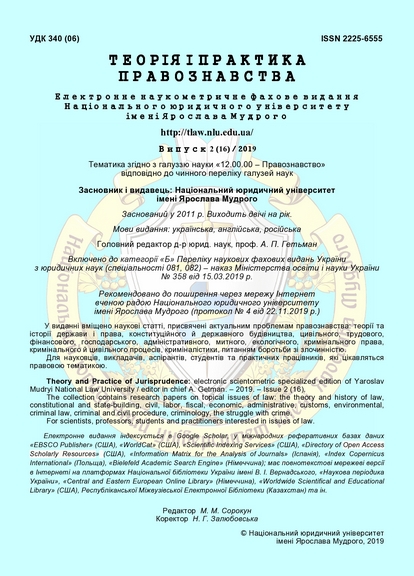Some issues of attributing a bank as problematic
DOI:
https://doi.org/10.21564/2225-6555.2019.16.186100Keywords:
economic turnover, problematic bank, NBU, separation of powers, system of checks and balancesAbstract
The article critically assesses the provisions of national legislation regarding the normative consolidation of the powers of the National Bank of Ukraine as for the establishing the grounds for attributing a banking institution as problematic. Describing the fixed grounds for the stated action, the above conclusion was made taking into account the impossibility of vesting the NBU with legislative functions based on the postulates of the theory of separation of powers. Considering theoretical achievements, attention is drawn to the absence in the Constitution of Ukraine of a norm on classifying the NBU as a legislative, executive or judicial power. At the same time, attention is drawn to the difficulty of appealing against a decision of the country’s central bank on attributing a banking institution as problematic. Assigning a bank to a problematic category by the NBU poses a rather difficult problem to challenge the decision of the central bank of the state. Given the public-law nature of the dispute with the subject of power, such a dispute should be considered by a court of administrative jurisdiction. However, the complexity of such an appeal is determined not by the difficulty of determining the jurisdiction of the court as an integral part of the right to a fair trial. The peculiarity of material relationships in the system of economic turnover in this case is that the decision of the NBU to classify the bank as problematic belongs to information containing banking secrecyReferences
Boichuk, R.P. (2009). Deiaki problemy modernizatsii investytsiinoho zakonodavstva Ukrainy na suchasnomu etapi. Zakon, 4, 62–70 [in Ukrainian].
Zadykhailo, D.V., Kibenko, O.R., Nazarova, H.V. (2003). Korporatyvne upravlinnia. Kharkiv: Espada [in Ukrainian].
Tatsii, V.Ya. (2015). Vybrani statti, vystupy, interviu (2009–2014). O.V. Petryshyn, Yu.H. Barabash, V.I. Borysov (Eds.). Kharkiv: Pravo [in Ukrainian].
Pro banky i bankivsku diialnist: Zakon Ukrainy vid 07.12.2000 r. URL: https://zakon.rada.gov.ua/laws/show/2121-14/print.
Politychnyi entsyklopedychnyi slovnyk. (2015). Kharkiv: Pravo [in Ukrainian].
Protsiuk, I.V. (2015). Systema strymuvan i protyvah u funktsionuvanni mekhanizmu derzhavnoi vlady parlamentskoi derzhavy. Derzhavne budivnytstvo ta mistseve samovriaduvannia, issue 29, 3–17 [in Ukrainian].
Malyshkina, N.O. (2018). Poniattia form i pravovykh zasobiv funktsionuvannia systemy strymuvan ta protyvah u vzaiemodii vyshchykh orhaniv derzhavnoi vlady. Problemy zakonnosti, issue, 142, 45–55 [in Ukrainian].
Husarov, K.V. (2000). Problemы hrazhdanskoi protsessualnoi pravosubъektnosty. Candidate’s thesis. Kharkiv [in Ukrainian].
Zabokrytskyi, I.I. (2016). Podil vlady yak element suchasnoho konstytutsionalizmu: ukrainskyi ta zarubizhnyi dosvid u konteksti modelei orhanizatsii vlady. Visnyk Natsionalnoho universytetu «Lvivska politekhnika». Yurydychni nauky, 837, 122–130 [in Ukrainian].
Postanova Verkhovnoho Sudu u skladi Kasatsiinoho administratyvnoho sudu vid 17.07.2018 r. u spravi № 826/7817/16. URL: http://reyestr.court.gov.ua/Review/75326171
Downloads
How to Cite
Issue
Section
License
Copyright (c) 2019 Theory and practice of jurisprudence

This work is licensed under a Creative Commons Attribution 4.0 International License.




